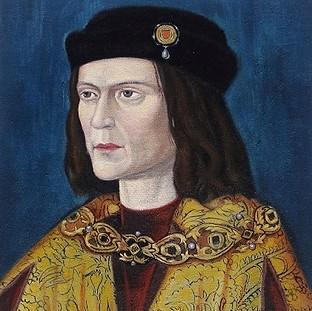King Richard III, the last of the Plantagenets, ruled England from 1483 until he was defeated at the Battle of Bosworth in 1485, the next-to-last major battle in what would later be called The Wars of the Roses. If you're watching "Game of Thrones" on HBO, the Wars of the Roses were Lancasters instead of Lannisters and Yorks rather than Starks - the show has more dragons and less sex than the real thing. Richard III was a York and if you think that show has a lot of characters and craziness, try to follow the actual Wars of the Roses.
They were not all that nice to each other then and his body was 'despoiled' - read into that what you will - though he may have had it coming, since he was implicated in the murders of Edward V, Henry VI and Prince Richard. Claims of sorcery against the queen and a bunch of beheadings got him his crown.
He died fighting the army of Henry Tudor (who became Henry VII, the first monarch of the House of Tudor) and after the battle, his body was carried to Leicester and buried without ceremony in the church of the Franciscan Friary, called Greyfriars.
That much is known. What is lost to antiquity is where the church was. Henry VIII dissolved the monasteries during the English Reformation in 1538 and it was said Richard III's bones were thrown into the River Soar. But archaeologists have not given up hope and they want to look under...a government parking lot.
Richard III. Popular among no one in England except archaeologists. Credit and link: Braintree and Witham Times
It isn't just academic archaeologists. Amateurs (hey, Sherlock Holmes was an amateur) have done some interesting work trying to pin down the location of Richard III's burial too. But that means first finding the monastery. Ground-penetrating radar to narrow the dig sites for their two-week expedition will help, they believe.
Richard Buckley, co-director of the archaeology service at the University of Leicester, told the (unidentified reporter) Press Association, "Although in many ways finding the remains of the king is a long shot, it is a challenge we shall undertake enthusiastically. There is certainly potential for the discovery of burials within the area, based on previous discoveries and the postulated position of the church."
If they find any remains, they will undergo DNA analysis to confirm that they are those of Richard III. Then the revisionist history can begin. Historians love to write papers debunking other historians and proponents of Richard III contend he was not as awful as the Tudors made him sound.
Still, even if he was only 50% as bad as history paints him, it's kind of a shame he didn't last until the end of the Wars of the Roses so he could have been drowned in a barrel of wine too.



